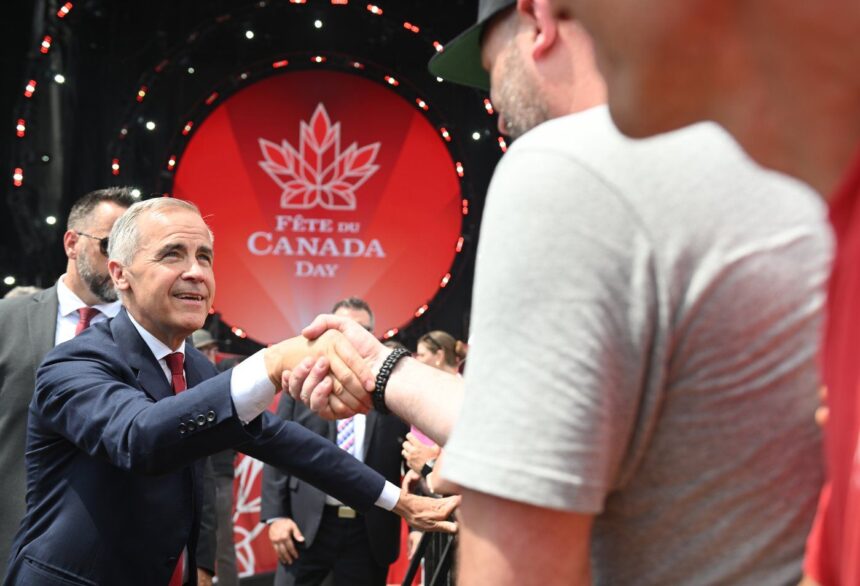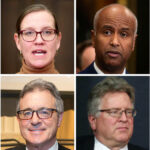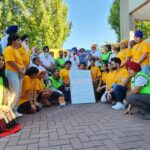As afternoon rain gave way to clearing skies over Parliament Hill yesterday, thousands of Canadians draped in red and white gathered for what many described as the most politically charged Canada Day celebrations in recent memory.
Across the sprawling festival grounds, families shared picnics while performers from across the country took to stages. But beneath the festivities, conversations frequently turned to the pressing challenges facing the nation – from housing affordability to healthcare strains that have dominated headlines throughout the spring legislative session.
“We stand at a crossroads,” declared Finance Minister Mark Carney during his address to the crowd. “Our shared values are under pressure, but they remain our greatest strength.” His comments came as opinion polls show deepening regional divisions over resource development and climate policies, with an Angus Reid survey last week revealing that 68% of Canadians believe the country is “more divided than ever.”
The celebrations in Ottawa reflected this complex national mood. Near the Centennial Flame, Emily Thibault, a nurse from Rimouski, told me she drove five hours with her family despite her concerns about healthcare funding. “I wanted my children to feel what it means to be Canadian, even as we argue about how to fix our problems,” she said, adjusting a maple leaf painted on her daughter’s cheek.
Prime Minister Singh’s Canada Day address struck a notably different tone from previous years, acknowledging frustrations while calling for renewed national purpose. “The Canadian experiment has never been easy,” Singh told the crowd of approximately 25,000. “Our history is one of overcoming differences to build something greater than ourselves.”
The celebrations occurred against the backdrop of last month’s tense First Ministers’ conference, where provincial leaders clashed over the federal housing acceleration fund. Ontario Premier Jennifer Jones criticized what she called “Ottawa’s one-size-fits-all approach,” while B.C.’s Premier Samuel Chen praised the framework as “exactly the flexibility provinces need.”
Data from Statistics Canada released Friday shows these tensions aren’t merely political theatre – housing starts fell 12% nationwide in the second quarter despite emergency measures, while waitlists for family doctors have grown in eight provinces.
Yet Canada Day seemed to offer a deliberate pause from the partisan fray. At LeBreton Flats, where musical performances stretched into the evening, Yellowknife resident Thomas Nasogaluak reflected on his family’s journey south for the celebrations. “We saved for months to be here,” he said. “Back home, we’re worried about permafrost melt and food costs, but today reminds us we’re part of something bigger.”
The evening’s headline concert featured an unexpected collaboration between The Tragically Hip’s Rob Baker and Indigenous throat singer Tanya Tagaq that brought the crowd to its feet. Their performance of “Courage” seemed to capture the national mood – acknowledging struggle while finding beauty in resilience.
Behind the scenes, security was noticeably tighter this year following the Parliament Hill protest in May over agricultural policy. The RCMP confirmed deploying approximately 400 officers throughout the capital region, with Commissioner Lucille Robichaud stating that “ensuring Canadians can safely celebrate their national identity remains our priority.”
In his first Canada Day as Governor General, Wab Kinew emphasized reconciliation as central to the national project. “The path forward requires honest acknowledgment of our past,” Kinew told the gathered crowd. “But it also demands we recognize the tremendous capacity for change that defines us as Canadians.”
Perhaps most telling were the conversations happening away from official speeches. At a community barbecue in downtown Ottawa, I met Gurpreet Dhaliwal, who arrived from Punjab just three months ago. “I came for opportunity, but also because Canada still believes in building something together,” he said while waiting in line for his first poutine. “That’s rare in today’s world.”
As fireworks illuminated the night sky above the Peace Tower, the contradictions of the current Canadian moment were on full display – a nation simultaneously wrestling with serious challenges while demonstrating remarkable resilience. When the crowd spontaneously joined in singing “O Canada” after the official program concluded, the emotional weight was palpable.
Veterans Affairs Minister Caroline Wong, whose parents arrived as refugees in the 1980s, perhaps best captured the sentiment of the day. “Being Canadian has never meant agreeing on everything,” she told a gathering at the Canadian War Museum. “It means believing that our differences make us stronger, not weaker.”
As revelers dispersed into the warm summer night, many carrying small flags and memories of shared celebration, the question remains whether this spirit of unity can translate into progress on the issues that divide us once the political machinery resumes full operation after the holiday.
For now, at least, Canada Day offered a reminder that beneath the partisan battles lies a deeper connection – imperfect, evolving, but persistently hopeful.






